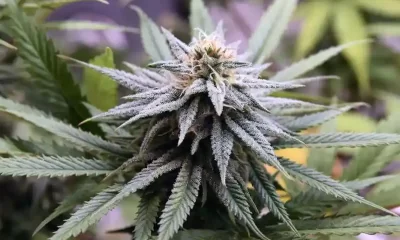Business
House Lawmakers Reintroduce Bipartisan Cannabis Expungement Bill

A bipartisan duo of lawmakers has reintroduced a bill to provide funding to state and local governments to expunge past cannabis convictions.
Two House lawmakers this week reintroduced bipartisan legislation to support states that enact policies to expunge convictions for past cannabis offenses. The bill, the Harnessing Opportunities by Pursuing Expungement (HOPE) Act, was introduced on Wednesday by Republican Representative Dave Joyce of Ohio and Representative Alexandria Ocasio-Cortez, a Democrat from New York.
If passed, the HOPE Act would provide federal grants to help states with the financial and administrative burden of expunging past convictions for marijuana-related offenses. The bill was previously introduced in 2021 but failed to be scheduled for a hearing or a vote in the previous Congress. The lawmakers behind the bill, who have been vocal advocates of cannabis policy reform at the federal level, said that expunging records can help reduce the lasting impact of a conviction for a minor criminal offense.
“The vast majority of petty, non-violent cannabis law violations take place on the state and local level, precluding millions of Americans from fundamental opportunities such as housing and employment,” Joyce said in a statement. “As both a former public defender and prosecutor, I understand firsthand how these barriers can negatively impact families and economic growth in Ohio and across the nation. The HOPE Act works to remove those barriers in a bipartisan manner to pave the way for the American Dream and remedy the unjust war on cannabis.
The legislation would provide up to $20 million in federal grants over 10 years to state and local governments to clear records of past marijuana convictions. Funding could be used to implement technology to clear large amounts of records automatically, clinics to assist individuals eligible for expungement, notification systems to inform people when their records have been cleared, administrative costs to seal records, and partnerships to assist with expunge records at scale.
“As we continue to advocate for the decriminalization and legalization of marijuana, this bipartisan bill will provide localities the resources they need to expunge drug charges that continue to hold back Americans, disproportionately people of color, from employment, housing and other opportunity,” said Ocasio-Cortez.
Brian Vicente, founding partner of the cannabis law firm Vicente LLP, said that the legislation complements an executive order issued by President Joseph Biden last year that pardoned all federal convictions for simple cannabis possession. At the time, the president called on governors to take similar action at the state level and wrote on Twitter that “Sending people to jail for possessing marijuana has upended too many lives — for conduct that is legal in many states.”
“The HOPE Act is true to its name. Its reintroduction by the ‘odd-couple’ of liberal Rep. Ocasio-Cortez and conservative Rep. Joyce shows the world that bipartisan support for marijuana reform exists at the highest level of government,” Vicente wrote in an email to High Times. “It reinforces the fact that key members of Congress agree with the majority of the American public—adults who use marijuana should not face criminal sanctions. This bill would put some real teeth behind President Biden’s 2022 declared interest in pardoning people with federal marijuana convictions by providing significant funding to state programs to expunge state-level marijuana offenses.”
The reintroduction of the HOPE Act drew quick praise from activists and cannabis industry representatives including the National Organization for the Reform of Marijuana Laws (NORML) and the National Cannabis Roundtable, a trade group that advocates for continued cannabis policy reform.
“The HOPE Act promises just that: hope and a second chance for people suffering the lifelong consequences of a state-level marijuana possession arrest,” NORML political director Morgan Fox said in a statement. “As more states repeal their failed policies of criminalizing marijuana consumers, it is incumbent upon Congress to assist them in repairing the associated harms it helped perpetuate for decades. This legislation is a great step toward righting the wrongs caused by prohibition and improving the lives of millions of people nationwide.”
Saphira Galoob, executive director of the National Cannabis Roundtable, said that “only through expungements can we lift the barriers on employment, education, and housing opportunities for those who have already been unjustly harmed by federal prohibition. With cannabis programs now in 38 states, to continue to hold back and punish individuals for what is now a state-legal activity is the definition of unjust, and NCR thanks U.S. Representatives Joyce and Ocasio-Cortez for their efforts to have Congress help correct these wrongs at long last.”
Source: https://hightimes.com/news/house-lawmakers-reintroduce-bipartisan-cannabis-expungement-bill/
Business
New Mexico cannabis operator fined, loses license for alleged BioTrack fraud

New Mexico regulators fined a cannabis operator nearly $300,000 and revoked its license after the company allegedly created fake reports in the state’s traceability software.
The New Mexico Cannabis Control Division (CCD) accused marijuana manufacturer and retailer Golden Roots of 11 violations, according to Albuquerque Business First.
Golden Roots operates the The Cannabis Revolution Dispensary.
The majority of the violations are related to the Albuquerque company’s improper use of BioTrack, which has been New Mexico’s track-and-trace vendor since 2015.
The CCD alleges Golden Roots reported marijuana production only two months after it had received its vertically integrated license, according to Albuquerque Business First.
Because cannabis takes longer than two months to be cultivated, the CCD was suspicious of the report.
After inspecting the company’s premises, the CCD alleged Golden Roots reported cultivation, transportation and sales in BioTrack but wasn’t able to provide officers who inspected the site evidence that the operator was cultivating cannabis.
In April, the CCD revoked Golden Roots’ license and issued a $10,000 fine, according to the news outlet.
The company requested a hearing, which the regulator scheduled for Sept. 1.
At the hearing, the CCD testified that the company’s dried-cannabis weights in BioTrack were suspicious because they didn’t seem to accurately reflect how much weight marijuana loses as it dries.
Company employees also poorly accounted for why they were making adjustments in the system of up to 24 pounds of cannabis, making comments such as “bad” or “mistake” in the software, Albuquerque Business First reported.
Golden Roots was fined $298,972.05 – the amount regulators allege the company made selling products that weren’t properly accounted for in BioTrack.
The CCD has been cracking down on cannabis operators accused of selling products procured from out-of-state or not grown legally:
- Regulators alleged in August that Albuquerque dispensary Sawmill Sweet Leaf sold out-of-state products and didn’t have a license for extraction.
- Paradise Exotics Distro lost its license in July after regulators alleged the company sold products made in California.
Golden Roots was the first alleged rulebreaker in New Mexico to be asked to pay a large fine.
Source: https://mjbizdaily.com/new-mexico-cannabis-operator-fined-loses-license-for-alleged-biotrack-fraud/
Business
Marijuana companies suing US attorney general in federal prohibition challenge

Four marijuana companies, including a multistate operator, have filed a lawsuit against U.S. Attorney General Merrick Garland in which they allege the federal MJ prohibition under the Controlled Substances Act is no longer constitutional.
According to the complaint, filed Thursday in U.S. District Court in Massachusetts, retailer Canna Provisions, Treevit delivery service CEO Gyasi Sellers, cultivator Wiseacre Farm and MSO Verano Holdings Corp. are all harmed by “the federal government’s unconstitutional ban on cultivating, manufacturing, distributing, or possessing intrastate marijuana.”
Verano is headquartered in Chicago but has operations in Massachusetts; the other three operators are based in Massachusetts.
The lawsuit seeks a ruling that the “Controlled Substances Act is unconstitutional as applied to the intrastate cultivation, manufacture, possession, and distribution of marijuana pursuant to state law.”
The companies want the case to go before the U.S. Supreme Court.
They hired prominent law firm Boies Schiller Flexner to represent them.
The New York-based firm’s principal is David Boies, whose former clients include Microsoft, former presidential candidate Al Gore and Elizabeth Holmes’ disgraced startup Theranos.
Similar challenges to the federal Controlled Substances Act (CSA) have failed.
One such challenge led to a landmark Supreme Court decision in 2005.
In Gonzalez vs. Raich, the highest court in the United States ruled in a 6-3 decision that the commerce clause of the U.S. Constitution gave Congress the power to outlaw marijuana federally, even though state laws allow the cultivation and sale of cannabis.
In the 18 years since that ruling, 23 states and the District of Columbia have legalized adult-use marijuana and the federal government has allowed a multibillion-dollar cannabis industry to thrive.
Since both Congress and the U.S. Department of Justice, currently headed by Garland, have declined to intervene in state-licensed marijuana markets, the key facts that led to the Supreme Court’s 2005 ruling “no longer apply,” Boies said in a statement Thursday.
“The Supreme Court has since made clear that the federal government lacks the authority to regulate purely intrastate commerce,” Boies said.
“Moreover, the facts on which those precedents are based are no longer true.”
Verano President Darren Weiss said in a statement the company is “prepared to bring this case all the way to the Supreme Court in order to align federal law with how Congress has acted for years.”
While the Biden administration’s push to reschedule marijuana would help solve marijuana operators’ federal tax woes, neither rescheduling nor modest Congressional reforms such as the SAFER Banking Act “solve the fundamental issue,” Weiss added.
“The application of the CSA to lawful state-run cannabis business is an unconstitutional overreach on state sovereignty that has led to decades of harm, failed businesses, lost jobs, and unsafe working conditions.”
Business
Alabama to make another attempt Dec. 1 to award medical cannabis licenses

Alabama regulators are targeting Dec. 1 to award the first batch of medical cannabis business licenses after the agency’s first two attempts were scrapped because of scoring errors and litigation.
The first licenses will be awarded to individual cultivators, delivery providers, processors, dispensaries and state testing labs, according to the Alabama Medical Cannabis Commission (AMCC).
Then, on Dec. 12, the AMCC will award licenses for vertically integrated operations, a designation set primarily for multistate operators.
Licenses are expected to be handed out 28 days after they have been awarded, so MMJ production could begin in early January, according to the Alabama Daily News.
That means MMJ products could be available for patients around early March, an AMCC spokesperson told the media outlet.
Regulators initially awarded 21 business licenses in June, only to void them after applicants alleged inconsistencies with how the applications were scored.
Then, in August, the state awarded 24 different licenses – 19 went to June recipients – only to reverse themselves again and scratch those licenses after spurned applicants filed lawsuits.
A state judge dismissed a lawsuit filed by Chicago-based MSO Verano Holdings Corp., but another lawsuit is pending.
Source: https://mjbizdaily.com/alabama-plans-to-award-medical-cannabis-licenses-dec-1/
-

 Business2 years ago
Business2 years agoPot Odor Does Not Justify Probable Cause for Vehicle Searches, Minnesota Court Affirms
-

 Business2 years ago
Business2 years agoNew Mexico cannabis operator fined, loses license for alleged BioTrack fraud
-

 Business2 years ago
Business2 years agoAlabama to make another attempt Dec. 1 to award medical cannabis licenses
-

 Business2 years ago
Business2 years agoWashington State Pays Out $9.4 Million in Refunds Relating to Drug Convictions
-

 Business2 years ago
Business2 years agoMarijuana companies suing US attorney general in federal prohibition challenge
-

 Business2 years ago
Business2 years agoLegal Marijuana Handed A Nothing Burger From NY State
-

 Business2 years ago
Business2 years agoCan Cannabis Help Seasonal Depression
-

 Blogs2 years ago
Blogs2 years agoCannabis Art Is Flourishing On Etsy













